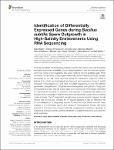Identification of Differentially Expressed Genes during Bacillus subtilis Spore Outgrowth in High-Salinity Environments Using RNA Sequencing
Nagler, Katja
Krawczyk, Antonina O.
Jong, Anne De
Madela, Kazimierz
Hoffmann, Tamara
Laue, Michael
Kuipers, Oscar P.
Bremer, Erhard
Moeller, Ralf
In its natural habitat, the soil bacterium Bacillus subtilis often has to cope with fluctuating osmolality and nutrient availability. Upon nutrient depletion it can form dormant spores, which can revive to form vegetative cells when nutrients become available again. While the effects of salt stress on spore germination have been analyzed previously, detailed knowledge on the salt stress response during the subsequent outgrowth phase is lacking. In this study, we investigated the changes in gene expression during B. subtilis outgrowth in the presence of 1.2 M NaCl using RNA sequencing. In total, 402 different genes were upregulated and 632 genes were downregulated during 90 min of outgrowth in the presence of salt. The salt stress response of outgrowing spores largely resembled the osmospecific response of vegetative cells exposed to sustained high salinity and included strong upregulation of genes involved in osmoprotectant uptake and compatible solute synthesis. The σB-dependent general stress response typically triggered by salt shocks was not induced, whereas the σW regulon appears to play an important role for osmoadaptation of outgrowing spores. Furthermore, high salinity induced many changes in the membrane protein and transporter transcriptome. Overall, salt stress seemed to slow down the complex molecular reorganization processes (“ripening”) of outgrowing spores by exerting detrimental effects on vegetative functions such as amino acid metabolism.
No license information

